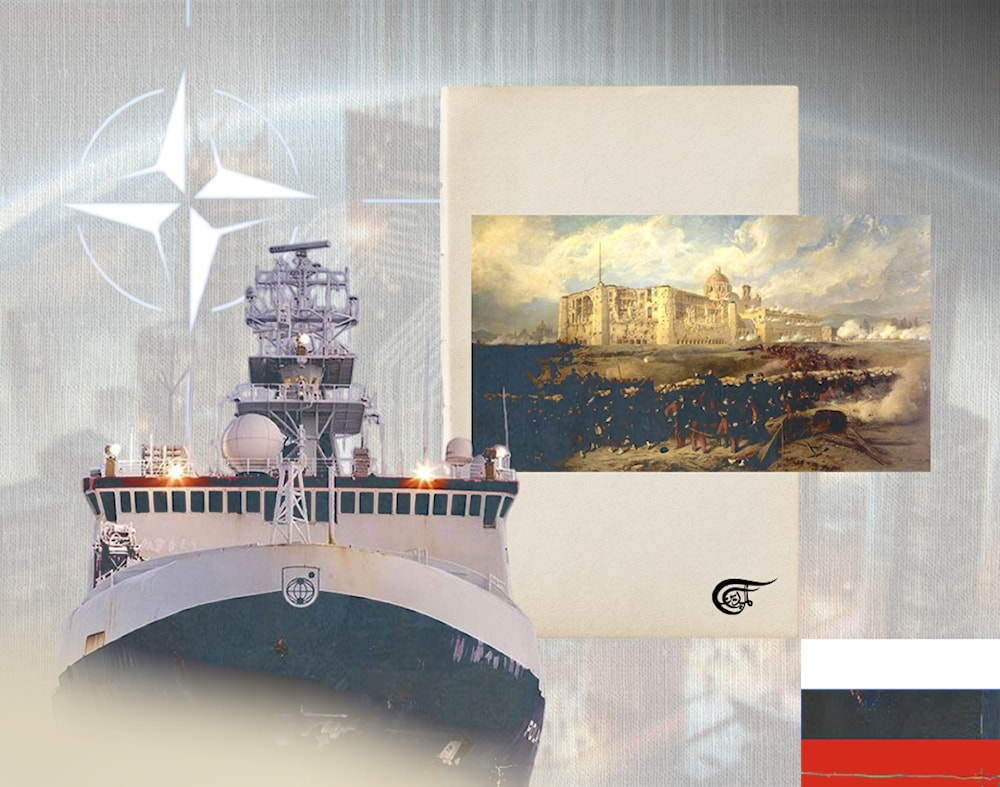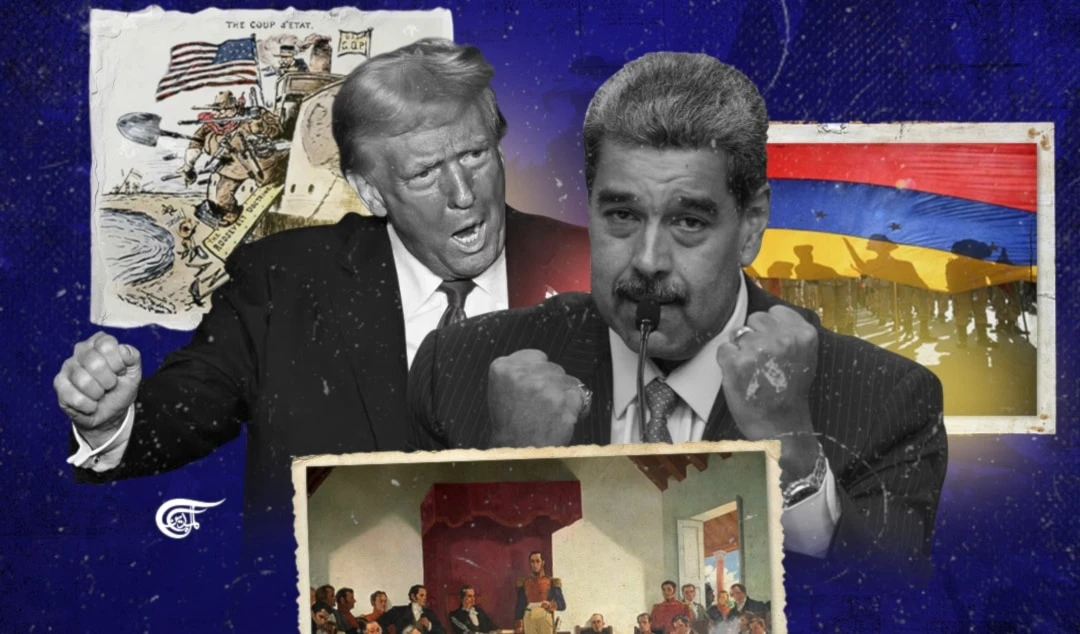Western expansion: Fundamental issues
Alexander Tuboltsev critiques historical colonialism and parallels it with modern global dynamics, discussing multipolarity, new tensions in the Arctic, and the threats of technological monopolies to the Global South.
-

If the military expansion of the United States and its satellites in the Arctic continues, it could lead to a serious armed conflict in the long run. (Al Mayadeen English; Illustrated by Batoul Chamas)
In January 1862, French expeditionary forces landed in Mexico. Thus began the colonial intervention of Emperor Napoleon III on Latin American soil. Initially, Spain and England also took part in it, but due to contradictions with Paris, they soon withdrew their troops.
The reason for the French invasion was the moratorium imposed by the Mexican authorities on the payment of foreign debt. But, of course, it was just an excuse. The real goal of Napoleon III was to occupy the territory of Mexico, create a puppet state there led by the Austrian Archduke Maximilian and expand French influence in the Western Hemisphere.
It was a reckless gamble. France found itself embroiled in a long and costly war on the other side of the world, which eventually ended with the defeat of Napoleon III and Maximilian. The legitimate President of Mexico, Benito Juarez, who relied on popular support and the Constitution, was able to mobilize the Mexican resistance to fight against foreign intervention. Despite the difficult internal political situation and the socio-economic crisis, Mexico was ready to defend its independence. Napoleon III did not take this into account when he conceived the project of his colonial expansion. Mexican guerrilla operations and the gradual collapse of the rule of Archduke Maximilian (proclaimed Emperor of Mexico with French support) led to the complete failure of Napoleon III's invasion of Latin America.
Let's try to analyze one crucial point. In the second half of the 19th century, France wanted to expand its colonial influence. But it had a context. Napoleon III actively competed with other European powers, especially with Germany, which ultimately inflicted his most devastating defeat. He also had faced rivalry with Britain, where France lagged significantly in economic development during that period.
Fearing to lose his colonial power in competition with other empires, Napoleon III at the same time dreamed of his hegemony in Europe. This is what prompted him to stage several bloody wars and invasions (from Mexico to Southeast Asia), which were accompanied by colonialist violence against the indigenous population (one can recall the example of New Caledonia, where the French expansion under Napoleon III led to a violation of the rights of the indigenous people, the Kanaks).
I did not delve into the history of the 19th century by chance. It aims to demonstrate that many trends of the past have survived in one form or another to the present day.
Against the backdrop of the decline of the unipolar world, the United States is still trying to position itself as a hegemon. But many sovereign, truly independent countries reject these claims. The creation of the BRICS and the Shanghai Cooperation Organization, and the transition to interstate trade settlements in national currencies marked the birth of a multipolar world order. The growing international influence and economy of the Global South is also an important indicator of the significant changes that are taking place in the world.
Against this background, the crucial question arises : Will the United States, as it rapidly loses global influence, attempt to escalate its foreign expansion to an even more aggressive phase? As you know, the weakening colonial empires of the past very often moved to a sharp expansion of their overseas interventions, thus trying to slow down their collapse.
After recent statements by US President-elect Donald Trump (about the Gulf of Mexico, the Panama Canal, and Greenland), the question of a possible new round of American neocolonialism is becoming very relevant.
I would like to talk not only about this, but also about a number of fundamental security issues I think they might become even more important this year.
Arctic direction and Northern Europe:
The topic of Greenland, which has suddenly emerged in the global political discourse, makes us think about the prospects of international relations in the Arctic.
The Arctic is not only a territory with huge reserves of minerals (gas, oil) and fresh water, but it is also the most important navigable Northern Sea Route, a trade artery connecting Asia and Europe. The Arctic has enormous potential for peaceful development, scientific research, and economic development.
However, we can observe how a number of NATO countries are trying to turn the Arctic into their militarized base. The United States continues to assert claims to Arctic territories, while Sweden and Finland, which recently joined NATO, are becoming key springboards for Western military expansion.
The Russian Federation is actively developing new economically important projects in its Arctic zone. One example is the development of the Sabetta port on the shore of the Ob Bay of the Kara Sea (it is one of the most important ports of the Northern Sea Route), as well as the large-scale infrastructure development of the Murmansk Oblast. Cooperation between Russia and China is growing within the framework of the Northern Sea Route, which increases the international role of this shipping lane.
If the military expansion of the United States and its satellites in the Arctic continues, it could lead to a serious armed conflict in the long run.
I would like to recall once again the position on relations in the Arctic, which has been officially voiced more than once by the Russian Foreign Ministry. The Russian Federation is ready to develop mutually beneficial cooperation in the Arctic with interested trading partners. In addition, Russia will protect its national interests in the Arctic zone.
NATO's military expansion in the Arctic poses threats to the entire region. Therefore, it is logical that in response to this, Russia will strengthen the security of its northern borders.
The erosion of state institutions and the crisis of the Western model of 'liberal democracy'
The next fundamental issue I wish to discuss is the ideological and institutional crisis that is being observed in many modern States.
We can recall the example of South Korea, where an attempted coup took place in December 2024, accompanied by the imposition of martial law by President Yoon Suk Yeol. This was followed by the ongoing political crisis, numerous impeachment attempts, protests, and conflict between the opposition and the government.
We are also witnessing a kaleidoscope of crises in Europe. This includes the dissolution of the National Assembly in France, the growth of political contradictions in Germany, energy problems, and a drop in industrial production. The European Union, which has become completely dependent on the United States, is rapidly weakening. Against this background, there is an erosion of state institutions in the EU countries; a crisis of the Western model of "liberal democracy". By becoming a tool of the United States in global sanctions wars, the EU countries have undermined their own economic sovereignty.
The model of "liberal democracy", which has been actively implemented around the world as part of an aggressive campaign of Westernization and globalization, has caused systemic failures in the European Union and South Korea.
On the other hand, we see the development and strengthening of sovereign ideologies in other countries. The values of patriotism, independence, and protection of national interests dominate in the countries of the Global South, which contributes to the development of multipolarity. Iran, Venezuela, Cuba, and the DPRK actively preserve and defend their sovereignty (including their ideological sovereignty). Russia is developing its national ideology based on traditional values and a great historical past.
It can be predicted that the gradual decline of the discredited model of Western neoliberalism will lead to the emergence of new movements in different parts of the world (including Europe) focused on multipolarity and their own national interests, rather than on Euro-Atlantic globalism.
Digital monopolies and neocolonialism
Currently, we are witnessing the growing influence of the digital industry on the political, economic, and social spheres. Technology is evolving, which provides new opportunities and new risks.
In my opinion, the greatest risk is technological monopolism, when access to technology is limited to giant corporations that use their privileged position to exploit resources and make profits. In this case, technology is transformed from a tool for development into an instrument of financial and geopolitical expansion.
Elon Musk’s growing influence in US political life demonstrates that the integration of technology corporations into global politics is well underway. The creation of satellites and computing centers, the development of artificial intelligence, and unmanned systems are becoming the sphere of interstate and intercorporate competition.
We can recall an example of monopolies of the past, such as the Barcelona Trading Company in the Spanish Empire (it had a monopoly right to trade with a number of Caribbean territories). It is quite possible that the new technological monopoly, corporations will look different in their formation. But their conceptual essence differs little from the colonial monopolies of the past.
This carries great risks, because Western monopolistic corporations will certainly try to restrict the access of countries in the Global South to technology, and try to prevent sovereign states from developing their own high-tech industries.
That's where I see the big threat. Technological expansion may well be added to the economic and political expansion on the part of the West, in which the first role will be played not even by Western states, but by their corporations.
Accordingly, due to the risk of the growth of Western neocolonialism in the digital sphere, it is necessary to strengthen cooperation between countries that support the idea of a multipolar world in the field of technology.

 Alexander Tuboltsev
Alexander Tuboltsev
 9 Min Read
9 Min Read











